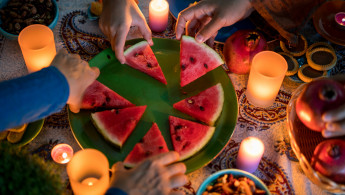Yalda: Iranian shopping mall decoration criticised over 'Jewish elements' by semi-official news agency
A decoration in an Iranian shopping mall set up for a local cultural festival has reportedly been criticised for incorporating what is claimed are Jewish elements.
An article for the semi-official Mehr News Agency said the Tehran mall's decoration had mixed elements of the Yalda Night celebration - to mark the longest night of the year - and Judaism's Sukkot, The Jerusalem Post reported on Wednesday.
Iranians, Afghans, Kurds, and other communities celebrated Yalda on Tuesday. The occasion marks the winter solstice and sees loved ones read poems and eat pomegranates and other foods.
The mall decoration is a popular spot for Iranians to snap photographs, according to the Mehr piece.
"[B]ut how many of them know that this décor is a combination of the Yalda celebration and Jewish… celebration?" it continued.
The problem the piece's author has seems to be based on her belief "[t]he roof and the accompaniment below it are reminiscent of… Sukkot… held by the Jews".
The Mehr article said Iran allows recognised faiths the freedom to practice their beliefs, adding that there is religious coexistence in the country.
Even so, "combining one Iranian celebration with another in décor can only distort it", according to the piece.
It said this is particularly so because influencers visit the location and promote it, unaware of its alleged "Jewish" elements. Such a claim has been widely rejected.
Podcast: We speak with leaders from the Mandaean community, to hear how their exodus has changed the religion, and how they are keeping traditions alive
— The New Arab (@The_NewArab) August 29, 2021
Tune in and listen to this episode of @TheNewArabVoice!https://t.co/Fe11kmcV7H
The Iranian regime, founded after a 1979 Islamic revolution, has long been accused of oppressing Jews and other religious and ethnic minorities.
The country's new authorities put senior Jewish Iranian figure Habib Elghanian to death less than three months after they came to power.
The small ethnoreligious Mandaean community, which has not gained acceptance as an official religion, has also endured significant repression in Iran since 1979.
They are not allowed to study at university or have jobs if they publicly reveal their faith, leading large swathes of Mandaeans to leave the country. Many of Iran's Baha'i community have also fled the country due to severe persecution.





 Follow the Middle East's top stories in English at The New Arab on Google News
Follow the Middle East's top stories in English at The New Arab on Google News


